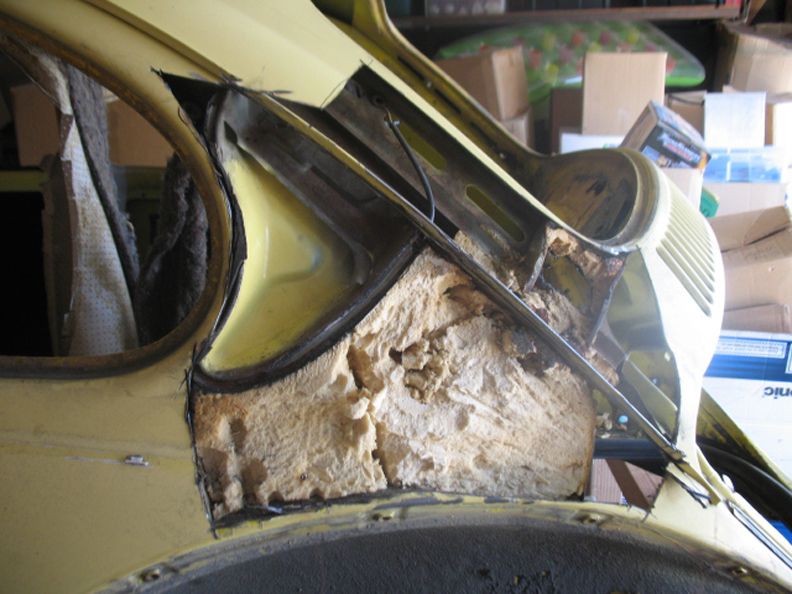
M030
Dork
11/11/14 9:05 a.m.
Is this a real thing? Fellow GRM board member Carbon suggested I do it to my Boxster, so said Boxster won't be so "floppy"
He said it "adds eight pounds and completely eliminates cowl shake, like if it was seam welded" sounds too good to be true. Is it?
http://grassrootsmotorsports.com/forum/grm/anyone-foam-fill-their-chassis/92620/page1/
Lots of negative feedback about it on this board mainly due to it inevitably turning the vehicle into a rust factory. Carbon seems largely undeterred by this.
I have seen it done and boy does that stuff attract and trap water.

NOHOME
SuperDork
11/11/14 11:35 a.m.
If I have to subsequently weld on that vehicle. I will NOT be happy.
Since the foam IS going to retain moisture ( it is already a by-product of the cure), then you can rest assured that someone will be welding on the car.

M030
Dork
11/11/14 12:21 p.m.
Does Porsche use such a foam in any OE applications?
The VW factory began filling certain areas between inner and outer metal skins to act as a sound deadener on the Super Beetles. They ALL rotted out exactly where the foam was added. From the inside out.
Foam is a ridiculous addition, and as flammable as gasoline.
Flat out Stupid Sauce.
It's very common at our track for the hornets to fill the bumpers and wheel well cavities with the stuff. I don't know about rigidity but it is awesome for impact absorption.
Unless you can find me a report where they foamed a car and took actual torsional rigidity readings before and after, I'm going to stay in the "the sound deadening effects make the car seem more solid" camp.
As the foam adds contact and material I will say it does increase torsional rigidity in the short term, this will only be a small increase in rigidity too. As the material gets worked (nothing is truly rigid, and it will still flex,) the foam will work away from the points of highest flex, cause the foam to be crushed and broken down mechanically (I am assuming the foam is rated for the environmental conditions you are putting it in.) Causing you to go back to a pre-foamed state. Only now you will have the added weight of the foam,the water it retains, and the fire hazards most foams present.
Like most on here I am in the "don't do it" camp.
In reply to Kenny_McCormic:
The only thing I've been able to find about the results is one person reported jacking the car up on the front corner then measuring from the ground to the bumper support on the opposite side. The difference before and after foam was 1/8" IIRC.
I've been thinking about a very cheap ~$500 beater for rallycross duties. I would consider it for something like that because the car would have a finite life expectancy anyway. I would not do it on something I cared about.

M030
Dork
11/11/14 7:29 p.m.
In reply to TeamEvil:
I've had my 72 super beetle for thirty years and I haven't had any rust issues with it. Where did VW apply the foam? That said, unless Porsche uses it on GT3s, I'm not putting any foam anywhere near my Boxster
In reply to Nick_Comstock:
I would guess 1/8" is well within measurement error using a method like you described.
Don't do it.
Just put a cage in it. That should make it more rigid.
Flynlow wrote:
In reply to Nick_Comstock:
I would guess 1/8" is well within measurement error using a method like you described.
Don't do it.
I totally agree about that. It's just the only thing I've read about the results that said anything other than "Yo, this thing is hella stiff bro"
"I've had my 72 super beetle for thirty years and I haven't had any rust issues with it. Where did VW apply the foam?"
At the bottom of the rear quarters, in the middle of the upper rear quarter and the area behind the plastic vents, at the bottoms sides of the rear window, and right above the fender bolts in the rear quarter as well.
The rust-out is MOST prevalent in the vent, fender bolt, and rear window area, although nearly ALL Beetles eventually rot at the bottom of the rear quarters where they come close to the lock pillar. The vents allow water to enter between the panels, the foam absorbs it, and the rust begins from the inside out.

You've been lucky . . . or live in a dry area or keep your Beetle indoors.





































